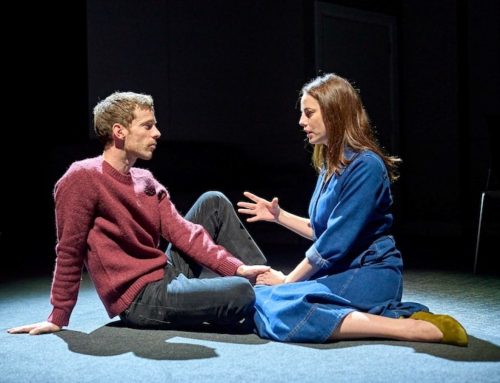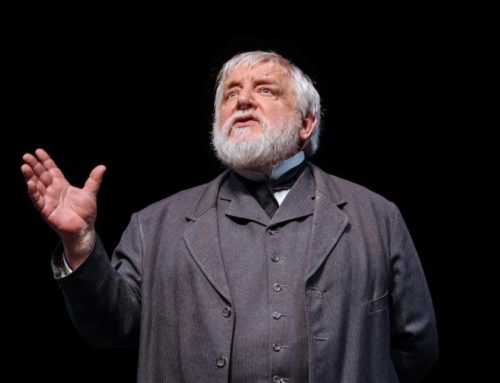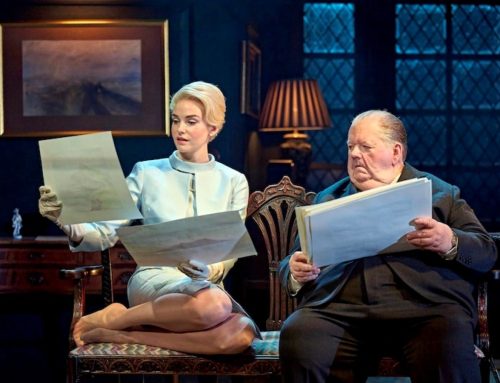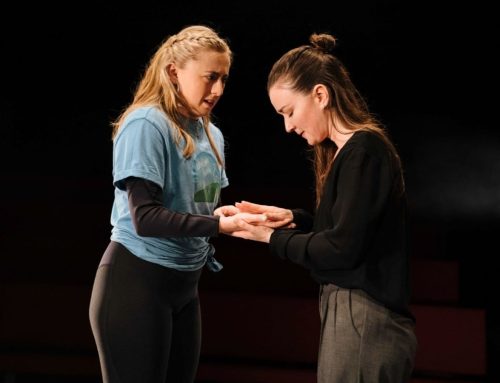Roy William’s interrogation of being Black and British in 2022 works well, both as troubled family drama and mature political reflection.
Press night 27 June 2022
“What do you want?” is the question that Roy Williams has his characters ask each other, again and again, in The Fellowship. This recurring urgent enquiry hangs over the play like a long afternoon shadow in Autumn.
At its heart, The Fellowship is asking this same question of an entire community. It is an interrogation of the current state of British blackness – a taking stock of where they stand and what Black people want now – in the form of a family tragedy. And pretty good it is too.
Middle-aged sisters Dawn and Marcia, the offspring of first generation Windrush immigrant Sylvia, spent their youth as firebrand protesters for racial justice on the streets of Brixton and Broadwater Farm.
Dawn, played with formidable presence by an electric Cherelle Skeete, has had kids of her own but still smoulders with the same righteous anger as she did in the 80s. Her enduring fury has been made worse by the murder of one of her sons in a seemingly racist attack, the responsibility for which crime she places firmly at the feet of his white girlfriend, Simone.
When surviving son, college-bound Jermaine, takes up with Simone, Dawn has to face some hard questions about what she really wants from the people in her life, including her unreliable, philandering musician husband Tony.
Sister Marcia, played with intelligent restraint by Suzette Llewellyn, meanwhile now has a successful career as a barrister and an on-off relationship with married white politician, Giles. The politico has a big ask of Marcia, one which threatens everything she has built. She too has to ask herself – what do I want and what am I willing to sacrifice to get it?
One suspects the answers to these questions that Williams gets from his characters, who each in their own way reflect a different strand of thought in three generations of Black Britons, are not necessarily those he wants to hear. But he is happy to let them speak for themselves, good or ill.
Williams certainly paints a credible picture of the quandary of a generation of black activists whose first generation parents are departing, and whose own kids many have very different ideas about their place in a majority white culture. Forty years ago, they wanted justice and an end to oppression, but what now?
As characters, Dawn and Marcia probably represent opposite ends of a fairly archetypal binary spectrum: integration at any price on the one hand, or a kind self-exclusion at the other. It is self-evident that an individual level the choice available to Britain’s BME population is a lot more complex than that, but it is a good enough starting point for a dramatic journey.
In the funniest part of the play, Dawn makes a list of some of the things she wants to be able to (but cannot quite let herself) enjoy – among these are watching Strictly Come Dancing in peace, reading The Daily Mail, and hanging the next black person who cooks jerk chicken on MasterChef.
Hers is a telling comment on how age softens and mellows even the most fevered of brows, by a male writer who clearly empathises with their predicament. Ironically, as Dawn herself says, what she wants most is not necessarily justice, but some of that privilege that white people keep to themselves.
The production falters in two aspects.
Libby Watson’s set, a sweeping staircase that overlooks a small central living space, is banded top and bottom by the glowing circles of a huge Alexa device. Think of the set for Alan Partridge’s satire The Day Today and you will get the tone. It is beautiful, but entirely wrong for this kind of production. The Alexa reference is barely relevant to the narrative and the set hems the actors in, restricting their movement.
Add into the mix some pedestrian direction from Paulette Randall and the play’s tone can occasionally feel flat.
WRITER Roy Williams
DIRECTOR Paulette Randall
DESIGNER Libby Watson
LIGHTING Mark Jonathan
SOUND Delroy Murray
SIMONE Rosie Day
JERMAINE Ethan Hazzard
SYLVIA / PC SPENCER Yasmin Mwanza
TONY Trevor Laird
MARCIA Suzette Llewellyn
DAWN Cherelle Skeete
Duration: 2 hours, 35 minutes. One interval.
Full Disclosure: I paid full box-office price for the ticket.
More Recent Reviews
Playfight. Soho Theatre.
Writer Julia Grogan’s breathtakingly assured debut play arrives at Soho Theatre following stellar reviews at the Edinburgh Fringe and [...]
All The Happy Things. Soho Theatre.
Naomi Denny’s three-hander comedy-drama All The Happy Things covers familiar themes within a recognisable premise. A grieving protagonist comes [...]
Telly. Bread and Roses Theatre.
The challenge with absurdist comedy is that many people do not find it funny. Laughing at the sheer weirdness [...]





